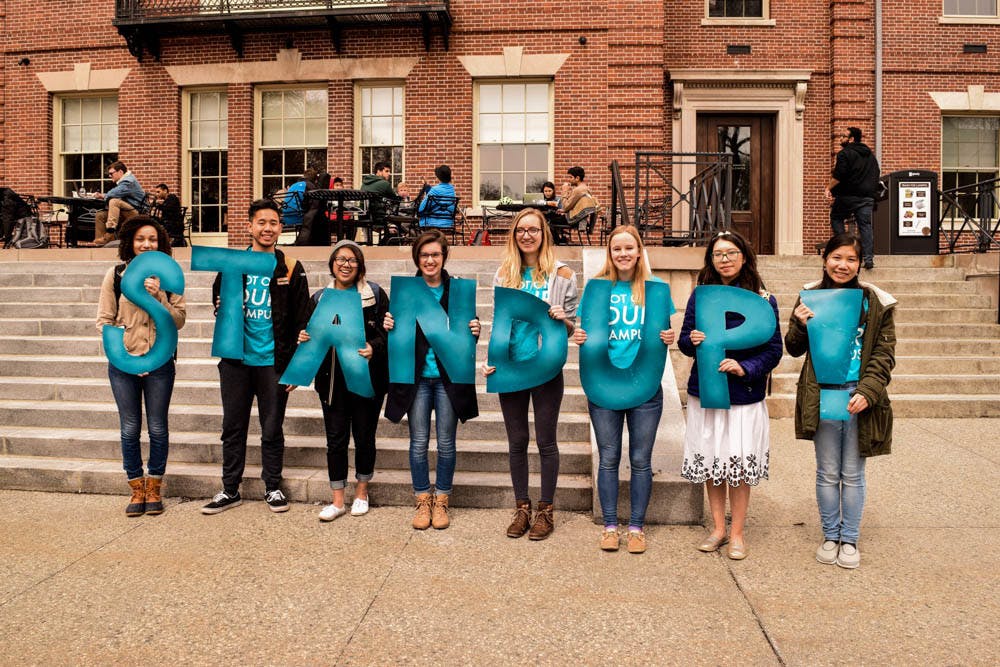Stand Up! sponsored a march against sexual assault and a keynote address by Sandra Kim, founder of Everyday Feminism, Saturday to mark the beginning of Sexual Assault Awareness Month on campus. Stand Up! is a student group that seeks to combat sexual assault at Brown and will be hosting a series of events including workshops and a letter-writing campaign throughout April.
When the march began at 1 p.m. on the Main Green, participants wove around campus chanting “respect, equality, that’s the way it’s gotta be,” and “yes means yes, no means no, however we dress, wherever we go,” in response to the number of sexual assaults that occur on college campuses around the country each year.
The procession stopped occasionally for a few minutes to demonstrate at specific locations on their route, including University Hall, a stop that Stand Up! founder Emily Schell ’16 told demonstrators was symbolically meaningful. “It’s important to take some time to rest and reflect, especially in front of University Hall,” Schell said as the group stopped. “People who have been at Brown a little while know that there’s a lot of meaning in this,” she added.
“Stand Up! is about getting people into conversations about what we can do personally,” Schell said to participants, adding that when she started Stand Up!, “this was the kind of campus conversation and community that (she) was hoping to create.”
The march lasted for half an hour, after which Kim delivered the keynote address for the month’s events at Salomon Hall. Kim spoke at length about how the dialogue around sexual assault has shifted in the years since she has been involved in advocacy. “Despite the growing level of conversation in the media and on college campuses, there is still such a deep level of shame and miseducation about what sexual assault and intimate partner violence is,” Kim said.
The issue of assault on campus is particularly meaningful for Kim, who was a trained sexual assault survivor advocate in college. Though that position gave her a great familiarity with the issue, she was unable to recognize the reality of her own assault until years afterwards due to the normalization of sexual crimes both on and beyond college campuses, she said. “The status quo in our society is systemic oppression,” Kim said. “We’ve been raised on these lies of what is and isn’t sexual assault and we need to shift our understanding of what assault really is,” she added.
But Kim cautioned that in unpacking the nuances of sexual assault, it is important to consider all voices to prevent erasure within activist groups, which already occurs far too often. “Despite the level of great work that’s being done, it’s often also very exclusionary for many people,” Kim said. She added that too often, movements — including those concerned with sexual assault awareness — ignore a number of groups “including people of color, queer and trans people, people with disabilities and undocumented individuals.”
“We need to really proactively create an environment where survivors feel like they’ll be believed and supported,” Kim said. She added that the pervasiveness of assault on campus necessitates this environment, especially considering that according to some estimates, one in four women and one in 16 men are targeted for attempted or completed sexual assault in college alone.
“Thanks to the patriarchy, men have been taught that women should be sexually available to them,” Kim said, adding that all of society has been made to endorse this problematic idea, making life difficult for survivors who cannot come to terms with their assaults. This should not mean that male survivors of assault should be ignored, she said, because “if you don’t fall under a dominant narrative, it can only be that much harder for you as a survivor.”
Kim closed her address by re-emphasizing that systemic oppression is prevalent because it erases the experiences of marginalized people. Considering this, it is critical that people commit to acknowledging the experiences of survivors from all backgrounds, especially when they don’t fit within normalized narratives of assault.
“It’s important that we’re all inclusive and intersectional everyday and in every situation,” Kim said. “If we do that, we can create a more loving and more just world around us right now.”





